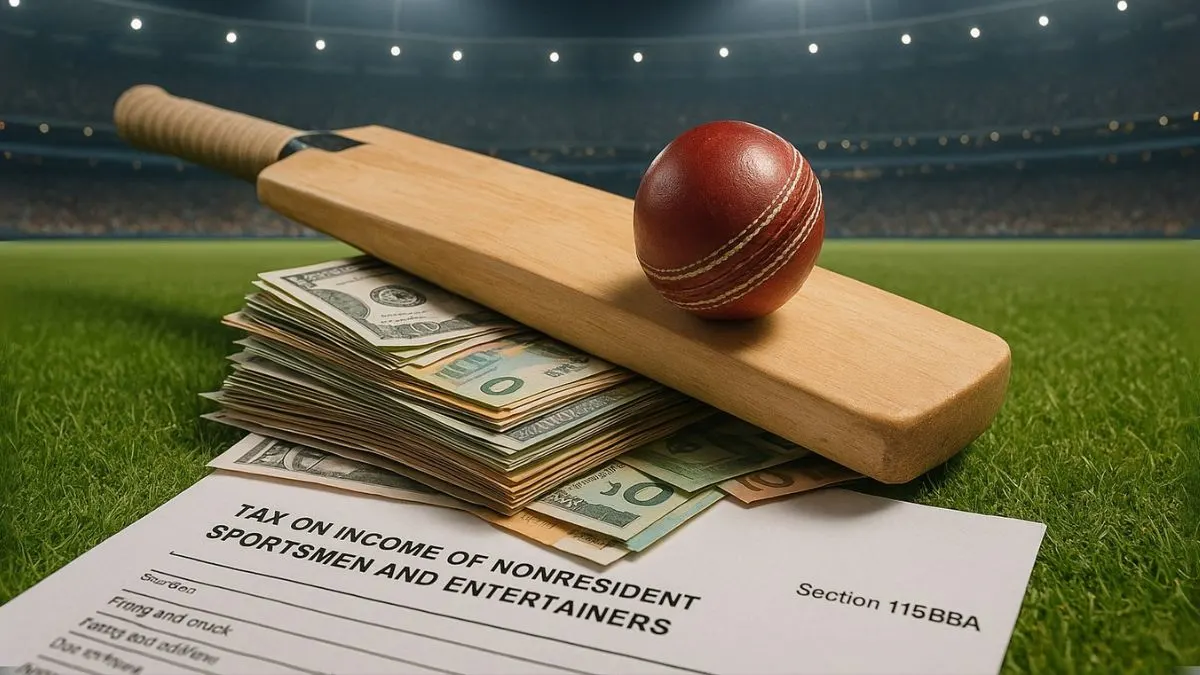
Taxation in India can be complex, especially for those who are not residents but earn income within the country. One such specialized provision is Section 115BBA of the Income Tax Act, which deals with the tax on non-resident sportsmen or sports associations. This section ensures that foreign athletes, sports associations, and entertainers who participate in events in India contribute their fair share to the country’s revenue.
The provision was introduced by the Direct Tax Laws (Second Amendment) Act, 1989 to plug loopholes and ensure a smooth, uniform tax structure for income earned by non-residents in the sports industry. Let’s break down what this section means, who it applies to, and how much tax needs to be paid.
Understanding Section 115BBA – The Basics
Section 115BBA primarily applies to:
- Non-resident sportsmen (including athletes, players, or coaches) who participate in any game or sport in India.
- Non-resident sports associations or institutions that derive income from organizing or participating in games and sports in India.
- Non-resident entertainers such as musicians, performers, or artists participating in events in India.
Under this section, a flat tax rate is levied on the specified income. The intention is to simplify taxation for non-residents and avoid complexities around deductions or progressive slabs.
Key Provisions under Section 115BBA of the Income Tax Act
When you look for section 115bba of income tax act pdf or section 115bba of income tax act applicability, you’ll find these core rules:
- Flat Tax Rate: Income earned by a non-resident sportsman, sports association, or entertainer from events in India is taxed at a fixed rate (currently 20% plus applicable surcharge and cess).
- Nature of Income Covered: This includes appearance fees, prize money, guarantee money, advertisement revenue, and income from related activities.
- No Deductions Allowed: Unlike other income heads, deductions under sections like 80C or business expenses are not available here.
- Tax Withholding at Source: The payer in India is responsible for deducting tax at source before making payments.
- No Need for Filing Return (in Certain Cases): If the tax has already been deducted at source and there’s no other income in India, the non-resident may not need to file an ITR.
Why Section 115BBA Exists
The primary reason Section 115BBA of the income tax act exists is to ensure fairness and ease of collection. Before its introduction, non-residents could avoid tax through complex deductions or by routing income in ways that made enforcement difficult. By having a flat rate and direct deduction system, the government secures its revenue without burdening foreign athletes and associations with lengthy compliance procedures.
Also Read: Special Provisions for Non-Residents Turning Resident
Impact on Non-Resident Sportsmen and Associations
For any non-resident sportsman or sports association, participating in Indian events now comes with clear financial expectations. For instance:
- A foreign cricket player earning match fees in an Indian Premier League (IPL) game will have 20% TDS applied to their earnings.
- An overseas sports association organizing a tournament in India will have their event income taxed under the same rules.
These provisions also ensure that Indian tax rules remain in harmony with global taxation norms, reducing disputes and compliance issues.
Example Calculation under Section 115BBA
Let’s assume a non-resident tennis player wins ₹1 crore in prize money from an event in India. Under Section 115BBA of income tax act, the applicable tax rate is 20% plus cess. So:
- Basic tax: ₹20,00,000
- Health & Education Cess (4%): ₹80,000
- Total tax payable: ₹20,80,000
This amount would be deducted at source before payment, and the net amount credited would be ₹79,20,000.
Link with Direct Tax Laws (Second Amendment) Act, 1989
The provision was introduced by the Direct Tax Laws (Second Amendment) Act, 1989 to specifically cover sporting and entertainment income of non-residents. It came at a time when India was emerging as a global sports destination, especially with cricket gaining massive international appeal.
Also Read: Taxation Rules for Non-Residents on Dividends, Interest, Royalties & Fees
Common Misunderstandings about Section 115BBA
- It applies only to cricket: No, it covers all games and sports.
- It applies only to individuals: No, associations and institutions are covered too.
- Residents can also be taxed under it: No, it’s specifically for non-residents.
- Prize money is exempt: Incorrect – prize money is taxable under this section.
Final Thoughts
The section 115bba of the income tax act is a straightforward but important provision ensuring that non-resident sports professionals and associations pay tax on income earned in India. By having a clear flat-rate system, it balances ease of compliance for foreign participants with India’s revenue needs.
💡 Want to ensure you comply with Section 115BBA without losing more than you should? Our experts at Callmyca.com can help you navigate foreign income tax in India so you can focus on winning, not paperwork.











